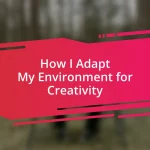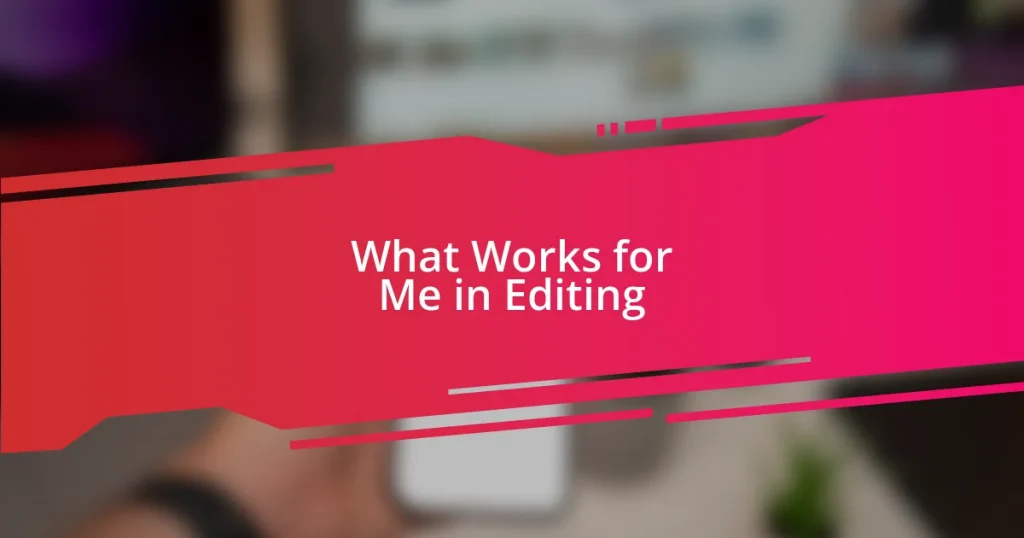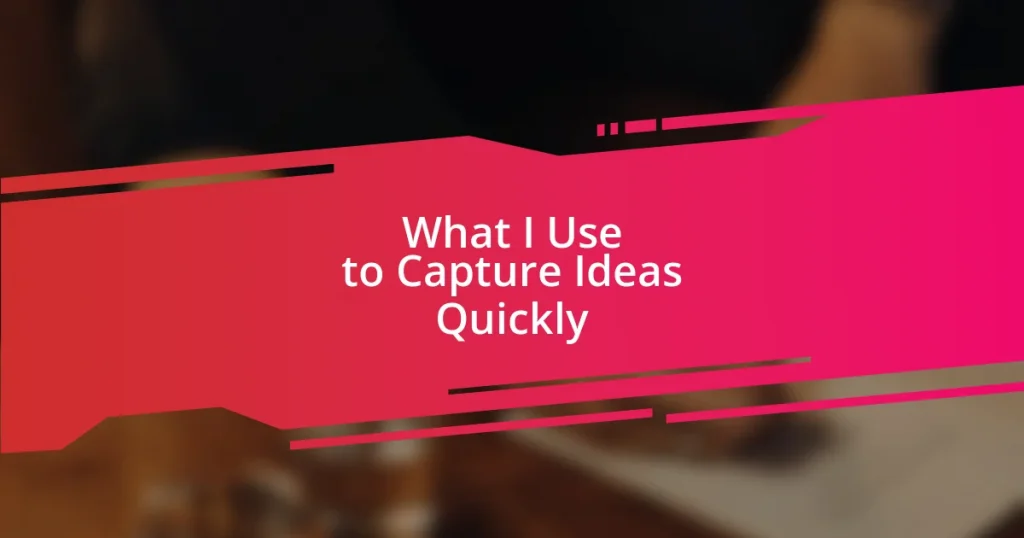Key takeaways:
- Writing prompts spark creativity and self-discovery, allowing writers to explore unique perspectives and emotional connections.
- Engaging with prompts helps break creative routines, encouraging imaginative storytelling and risk-taking in writing.
- Revisiting prompts can reveal personal growth and changing perspectives, deepening the narrative experience over time.
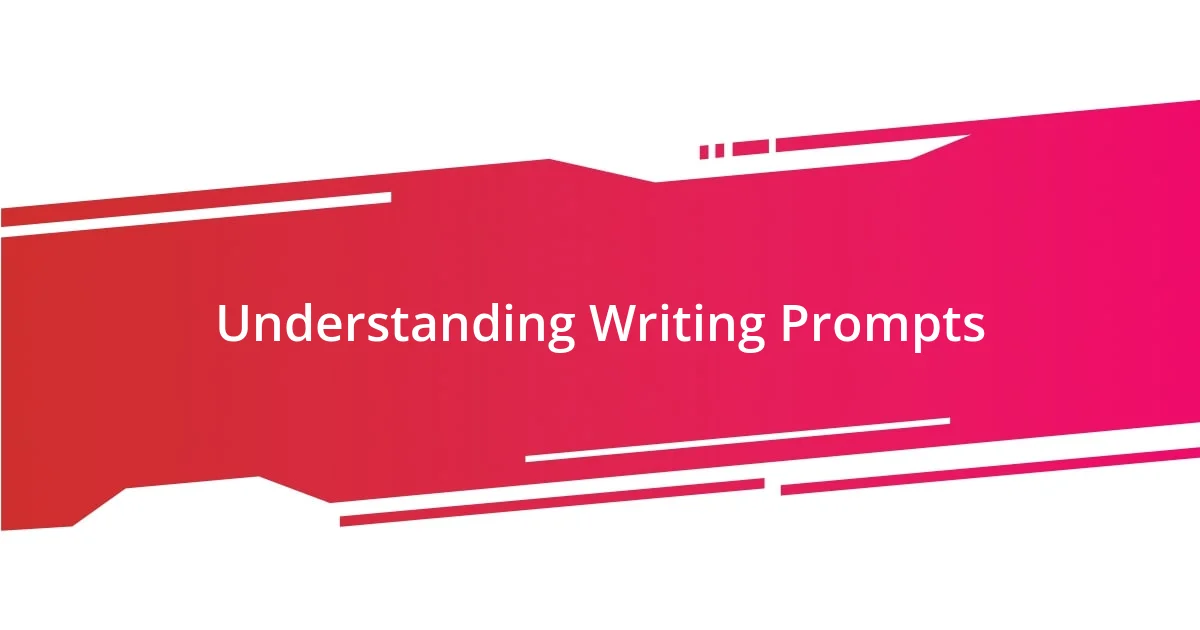
Understanding Writing Prompts
Writing prompts serve as powerful tools to ignite creativity and inspire ideas. I remember the first time I encountered a prompt that simply read, “What if the sun never rose?” It took me a minute to process the weight of that question. Suddenly, I was flooded with emotions about darkness, the unknown, and the value of light—a beautiful journey began.
These prompts encourage exploration beyond our typical boundaries. Have you ever found yourself staring at a blank page, feeling the weight of expectation? I certainly have. It’s in those moments that a simple prompt can provide a much-needed nudge, guiding me toward thoughts I didn’t even realize I had.
When engaging with a prompt, it’s essential to allow yourself the freedom to interpret it in your unique way. For example, when I faced a prompt asking for a story about a lost object, I didn’t just write about a forgotten sock—it became a tale of lost dreams and rediscovery. Isn’t it interesting how a single line can unfold layers of meaning and emotion?
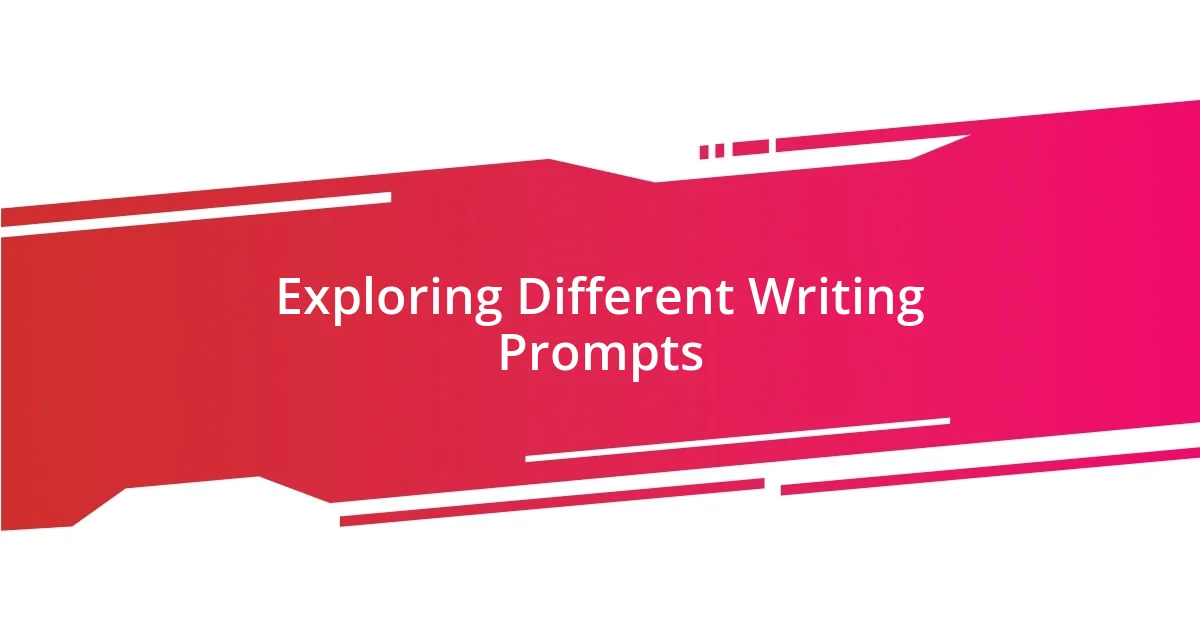
Exploring Different Writing Prompts
Writing prompts can vary greatly, often spanning different genres and styles. I recall a time when a prompt asked me to write a letter to my future self. At first, it seemed straightforward, but as I wrote, I found myself reflecting deeply on my current ambitions and fears. This emotional connection helped me discover what truly mattered in my life, illustrating how prompts can lead to profound self-discovery.
Another aspect worth noting is how writing prompts can challenge our comfort zones. For instance, I once encountered a prompt that asked me to write from the perspective of my pet. Initially, I chuckled at the thought, but as I dove into the assignment, I learned to appreciate my pet’s simple joys and fears. During that process, I realized just how versatile writing prompts can be, transforming into unique experiences that stretch our imagination.
In exploring the purpose behind different writing prompts, I’ve found that they encourage me to think outside the box. For example, when confronted with a prompt focused on an ordinary object, my initial thought was to describe it. However, I ended up crafting an entire narrative around its backstory, making it a character itself. Isn’t it fascinating how an everyday item can take on new life through creative exploration?
| Type of Prompt | Purpose |
|---|---|
| Reflective | Encourages introspection and self-discovery. |
| Perspective Shift | Challenges the writer to adopt an unconventional viewpoint. |
| Object Focus | Invites creative storytelling about mundane items. |
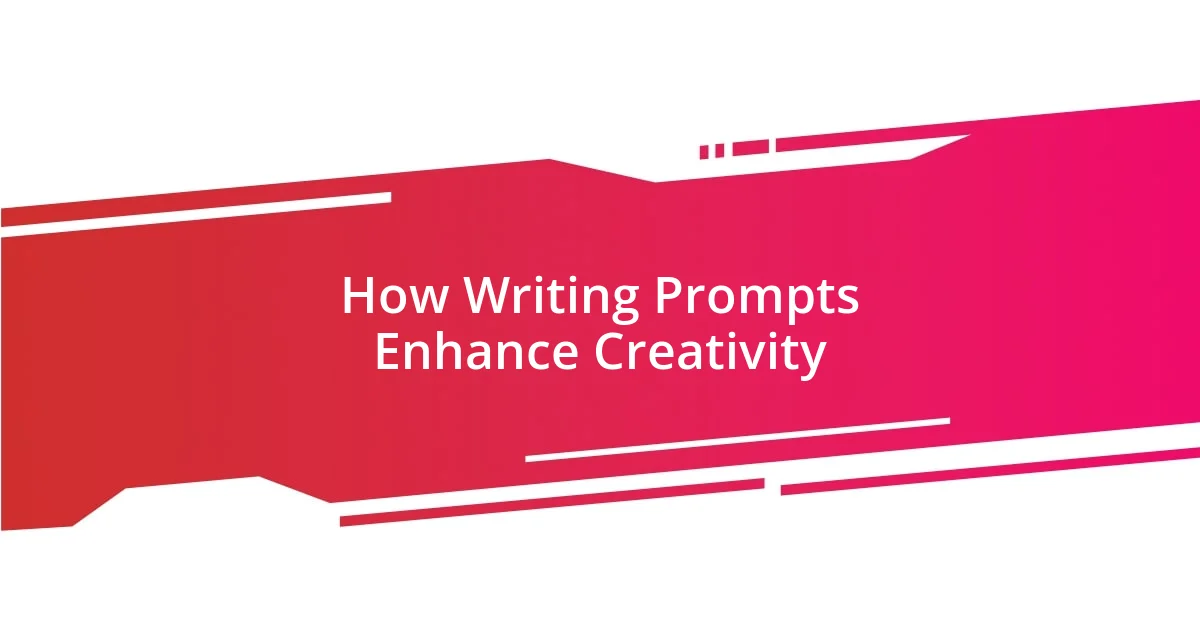
How Writing Prompts Enhance Creativity
When I first began using writing prompts, I found they unlocked parts of my creativity I didn’t even know existed. For instance, in response to a prompt about a forgotten letter, I initially thought of a mundane love story. However, as I wrote, I uncovered a deeper narrative about lost connections and unrequited feelings, making me reflect on my own experiences. That shift was eye-opening; it showed me how prompts can lead to unexpected emotional depths we rarely explore in daily life.
The beauty of writing prompts lies in their ability to push us to explore new ideas. Here are some ways they enhance creativity:
- Breaking Routine: They provide a break from habitual writing styles.
- Stimulating Imagination: The varied perspectives can spark original thoughts and scenarios.
- Encouraging Risk-Taking: Prompts challenge us to take creative leaps, like writing a poem from an inanimate object’s viewpoint.
- Inspiring Dialogue: Some prompts lead to conversations with characters outside our usual narrative scope.
- Fostering Emotional Connection: By tapping into personal memories or feelings, prompts can create a deeper narrative resonance.
With every writing prompt, I feel a little more adventurous in my storytelling, discovering new facets of myself with each exploration. It’s a journey of creativity that never ceases to amaze me.
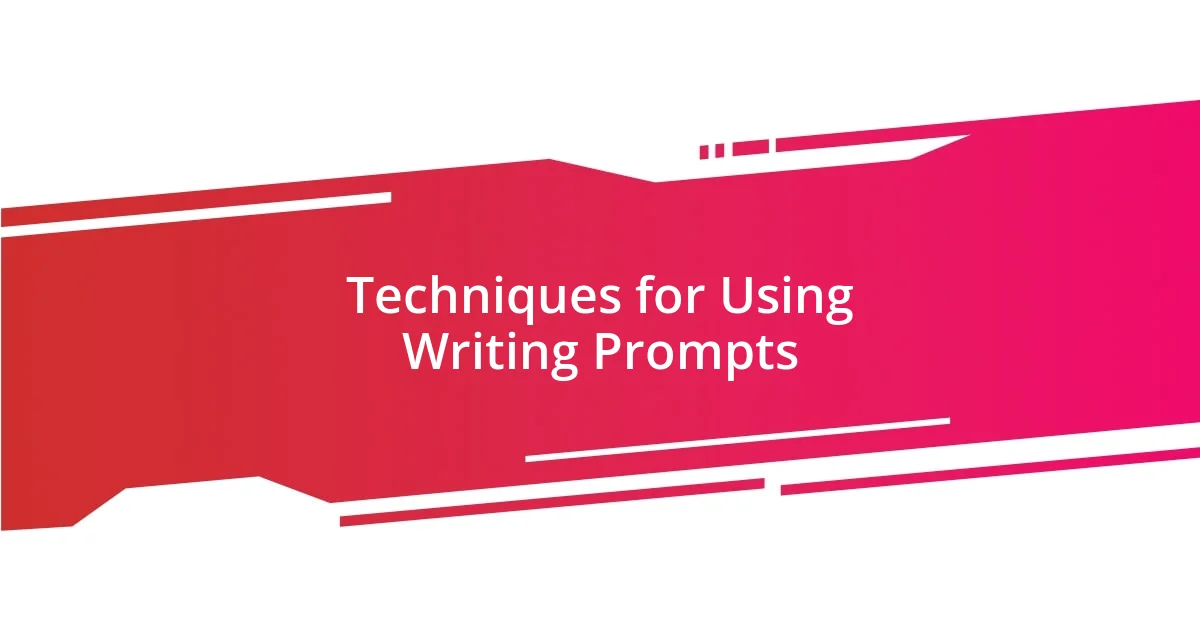
Techniques for Using Writing Prompts
Using writing prompts can be really effective when you approach them with an open mind. I once tried a prompt that asked me to describe a moment of silence. At first, I was stumped—what could I possibly say? But as I mulled it over, I unearthed a memory of a quiet evening shared with a friend, highlighting the beauty of unspoken connection. Isn’t it amazing how a simple prompt can unveil memories that may have otherwise remained buried?
Another technique I’ve found helpful is setting a timer. When I give myself just 15 minutes to respond to a prompt, it takes away the pressure of perfection. For instance, when I wrote about my favorite childhood toy, the ticking clock ignited my creativity. I penned down whatever came to mind, leading me to rediscover childhood dreams and aspirations. Have you ever experienced that rush of inspiration when the clock is against you? It’s exhilarating!
Lastly, don’t hesitate to revisit your older prompts. I recall skimming through my past writing and rediscovering a prompt about “the last piece of cake.” Initially, my response focused solely on the dessert itself. However, a year later, I wrote a completely different story, this time reflecting on the importance of sharing with loved ones—what a shift in perspective! Going back can reveal how your growth as a writer shapes your understanding of the same prompt differently; it’s like watching yourself evolve on the page.
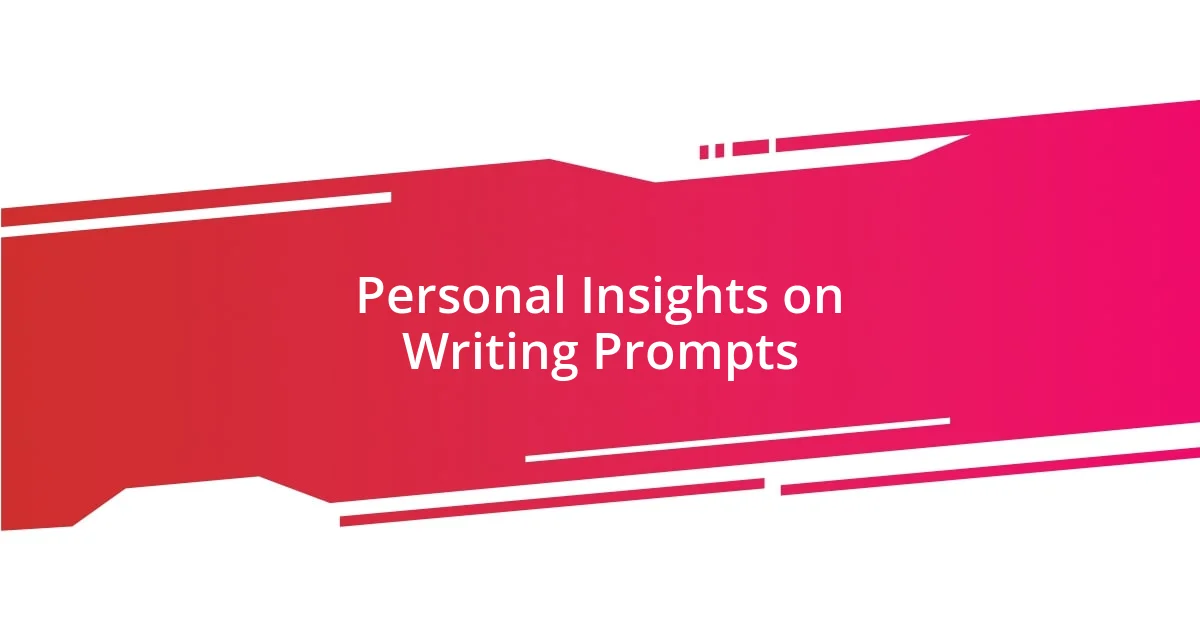
Personal Insights on Writing Prompts
Writing prompts have a unique way of guiding my thoughts and pushing boundaries. I remember one prompt that invited me to write about an object in my house as if it had feelings. At first, I was skeptical, but my old dusty guitar emerged as a surprising source of inspiration. Through its strings, I expressed a sense of longing and nostalgia—the guitar shared stories of long-forgotten jam sessions with friends that brought a wave of emotional warmth over me.
There was a time when I felt creatively drained, and a simple prompt about “a stranger’s smile” reignited my passion. I began to reflect on the many fleeting moments we experience daily that often go unnoticed. That day, I penned down not just a story but an entire scene at a café, where a smile from a stranger sparked a connection filled with potential. Isn’t it fascinating how a few words can serve as a catalyst for such profound exploration?
I’ve also observed that some of my most rewarding writing moments have come after I’ve revisited prompts. One particular prompt about “an unexpected gift” spoke to me differently six months later. Initially, I wrote about material things, but when I returned to it, I discovered a more profound story about relationships and the intangible gifts we often overlook. It’s a reminder that the same prompt can evolve alongside us, shining a light on our growth and changing perspectives as writers.

Overcoming Writer’s Block with Prompts
When I find myself stuck in a writing rut, I often turn to prompts like a lifeline. For instance, one day a prompt about “a hidden treasure” sparked an unexpected story about an old box of letters I discovered in my attic. That moment where I unearthed memories of long-lost friendships and cherished moments? It reminded me that the treasures within us can reignite our creativity when we least expect it.
It’s intriguing how a straightforward prompt can shift the trajectory of our thoughts. I remember sitting in a coffee shop when a prompt about “an unspoken rule” popped up on my phone. I took a deep breath and began exploring the subtle social dynamics around me, noticing how people politely averted their eyes. The transformation from mundane observation to a rich narrative was like flipping a switch. Have you experienced that flow, where suddenly the world seems to burst with stories waiting to be told?
Revisiting prompts can feel like catching up with an old friend. I stumbled upon a prompt about “a chance encounter” that I had written months ago. My earlier take was surface-level, but it struck me how much my perspective had matured since then. It’s as if the prompt invited me to dive deeper into the emotional undercurrents of human connection. Each revisit challenges me to evolve further as a writer, and it’s this journey through prompts that continuously nourishes my passion for storytelling.











